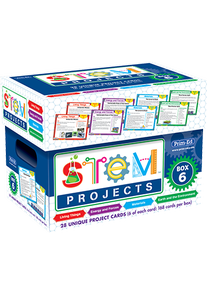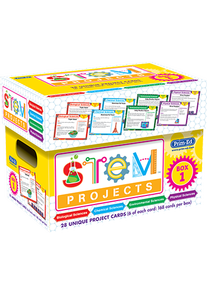-
0
Your cart is currently empty.
-
0
Your cart is currently empty.
STEM Projects: EYFS (International)
Preview Book
- Format: Boxed Resources
- Series: STEM Projects
- Code: 6177UK | ISBN: 9781912760077
- Subject: STEM
- Level: Early Years Foundation Stage
Price:
59.95
Quantity:
Inspire and prepare today’s students to become tomorrow’s innovators with STEM Projects.
The STEM Projects series provides opportunities for students to creatively apply skills and knowledge in science, design and technology, mathematics and digital technology, whilst completing short- or long-term projects. By their very nature, these projects develop skills in communication, problem-solving, reasoning, leadership and resilience.
Each set of cards contains a range of topics linked to the science national curriculum, but their variety also allows them to be successfully incorporated into a cross-curricular approach to topic teaching. Pressures on the curriculum often mean that it is difficult to ensure breadth and coverage of design and technology. Each topic contains key learning objectives from the design and technology national curriculum and covers contemporary environmental themes such as recycling and horticulture.
Each set of projects are cross-referenced to the design and technology strands of learning:
- cooking and nutrition;
- construction/structures;
- recycling;
- sheet materials including textiles;
- mechanisms;
- and horticulture.
Each project allows students to work creatively in small teams, using effective communication and collaboration skills, to plan, design, make and evaluate a thoughtful and innovative solution to a given task. When satisfied with their solutions, students are given a range of ways to showcase and discuss their designs, explaining how science was used throughout the project.
The STEM Projects series contains:
- two introductory cards explaining STEM education, including: time allocations for using the cards; tips for planning, differentiating, assessing and supporting teaching and learning; and classroom and resource management ideas;
- one card with icons, explaining each step of the designing and making process, in child-friendly language;
- one card explaining each science strand; how the projects can be linked to design and technology, digital technology and mathematics skills; and providing an overview of each project contained within the strand, including the task and specific design and technology strands of learning;
- six short-term projects and one long-term project for each learning strand of biological sciences, chemical sciences, environmental sciences and physical sciences; and
- six copies of each project to allow for small-group use.
The projects also contain opportunities for effective use of digital technology, including movie making, presentations, scanning QR codes and desktop (Internet) research. If the projects are chosen carefully, these sets of cards are an effective way of delivering the design and technology national curriculum.
A ‘stand out’ project:
- design and make a floating pirate ship (Chemical Sciences)
No reviews have been added for this product yet.















